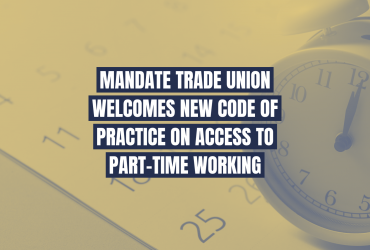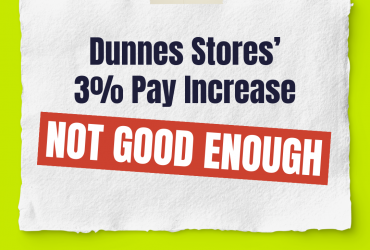
Is your mental health affecting how you do your job..?
Wednesday 10 January 2018By Bill Kelly
Mandate Divisional Organiser
WE ALL know how stressful working in retail is, particularly at this time of year when employers are pulling out all the stops to make as much profit as possible as we come to the end of the year.
It is the season to be jolly – and busy and overworked and much stressed and even abused by customers who are in search of a bargain.
Mandate in the past has highlighted this abuse in its Respect Retail Workers campaign and we continue to highlight this unacceptable abuse.
The stress of this “Season to be jolly” can sometimes be the last straw for many workers already struggling with their mental health. In fact, as an official together with my colleagues, I am coming across more and more members suffering with their mental health.
Unfortunately by the time we are aware of the mental health issues involved, many members already find themselves being taken through a disciplinary process.
STIGMA
It can be argued that there are many reasons for this – the stigma of mental health in Ireland, the lack of employer support for workers in retail, the complete lack of training for managers to deal with mental health issues…
It was against this background that I attended a recent Friday briefing held by ICTU and given by an organisation called See Change on mental health in the workplace.
See Change – The National Mental Health Stigma Reduction Partnership – is funded by the National Office for Suicide Prevention and is trying to change attitudes to mental health in the workplace so that employees and employers are more secure in starting a discussion about how mental health can affect each one of us.
Creating a workplace where workers can be open and positive about their own and others’ mental health is good for everyone, will help workers deal with stress, assist employers in developing supports for the one in four workers who may experience mental health difficulties, support managers in understanding mental health difficulties and reduce costs.
See Change has developed a six-step pledge programme to help Irish workplaces create an open culture around mental health and play a role in challenging the stigma surrounding mental health.
They also provide fully-funded training workshops for managers and staff. By signing up to the See Change workplace pledge, employers are showing they are committed to creating an open culture around mental health for workers at all levels.
These are signs to look out for and, while you are not expected to be an expert in the area of mental health, there are a number of key signs that may alert you that a colleague is in difficulty:
- Changes in a person’s usual behaviour – tiredness, increased absence, lack of care for personal appearance;
- Previously punctual workers being late regularly or developing difficulties with duties which used to be no problem for them;
- A noticeable increase in alcohol consumption or smoking;
- Loss of humour, the occurrence of constant headaches and bouts of tearfulness.
Sometimes the most helpful thing you can do is let someone know that you are there for them and simply listen. Ask how best you can help. Chat about everyday things. Ask how they are doing and go for a coffee. Avoid the clichés because telling someone to cheer up won’t help – being open-minded and listening will…
If you are having difficulties:
- Don’t bottle things up and ask for help if you need it.
- Take a break and get a change of scene and some fresh air.
- Celebrate achievement and don’t just focus on what you haven’t done.
- See what in-house support is available at work.
- Make time for non-work activities and meeting friends.
There are many support services available:
- The Samaritans – Tel: 116123
- www.yourmentalhealth.ie
- Employee assistance programmes
- Your GP
- www.seechange.ie/resources-and-support-services/
There is no doubt that that there is something we can all do. As workers we can be more open about mental health and challenge the stigmas that stop colleagues from getting help.
Employers need to do a lot more to provide managers with the training which will help them to assist workers while providing an employee assistance programme where there is none currently available.
As customers we can Respect Retail Workers.






